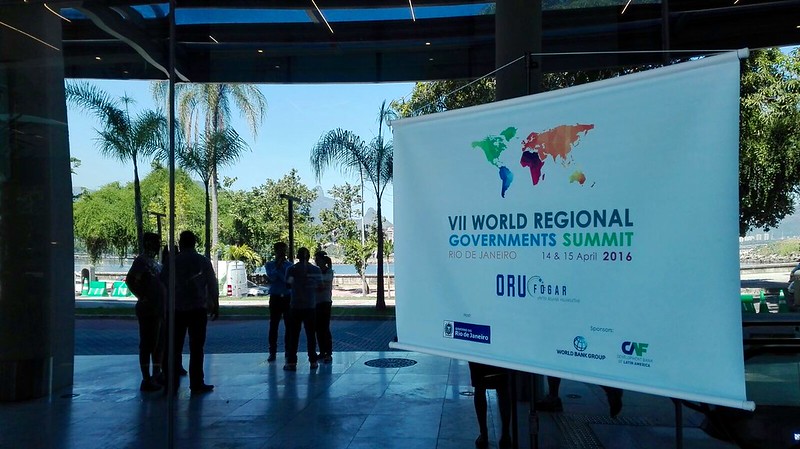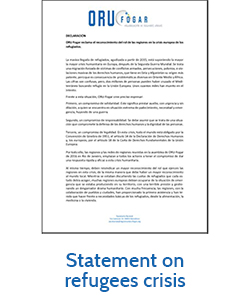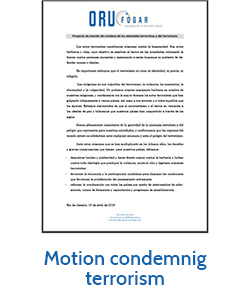VII World Regional Governments Summit and General Assembly, Rio de Janeiro, Brazil

Regional governments, how can we become more effective?
PHOTO ALBUM
STATEMENTS
PROGRAM
Wednesday 13 April 2016
10:00 – 13:00
Meetings of ORU Fogar’s work groups.
15:00 – 18:00
ORU Fogar’s Executive Bureau (only for Bureau members)
*The Summit languages will be ORU Fogar’s official languages (Spanish, French and English) and portuguese.
Thursday 14 April 2016
Place: Prodigy Hotel Santos Dumont
8:00 – 9:00
General Assembly (only for members)
9:00 – 10:30
General Assembly (open to all of the Summit’s participants)
11:00
Opening ceremony VII World Regional Governments Summit
12:30
Regions Adapt Signing Ceremony
13:00
Scenarios after Climate Change
13:30
Lunch
14:30
TABLE 1 What competences are intermediate governments better suited for?
17:00
TABLE 2 How can regional governments receive funding?
20:00
Cocktail offered by the State of Rio de Janeiro
Friday 15 April 2016
Place: Prodigy Hotel Santos Dumont
8:30
TABLE 3 Linking up with the nation-state
11:00
TABLE 4 How to reach a win-win situation with local governments. ORU and Habitat III
13:00
Lunch
14:30
TABLE 5 Autonomy to protect cultural diversity
16:30
TABLE 6 Managing the territory, guaranteeing sustainable policies
18:30
Awards Ceremony of the I Regional Best Practices Award
19:00
Closing
TOPICS
TABLE 1: What competences are intermediate governments better suited for?
The principle of subsidiarity, which establishes that problems need to be solved by the authority closest to its source, is one of the leitmotifs of regionalism. The quandary, however, lies in that, while everybody agrees that some competences need to be municipal, nobody really knows what competences need to be tackled at a regional level. The diversity of competence and capacity levels varies between countries, because of their history, traditions and political background. In general, however, the competence framework of regional governments ranges from personal services (education, health care, social services, housing…) to economic growth and the creation of infrastructures and services. The purpose of this debate is to answer the questions ‘what competences are essential for a regional government?’ and ‘what competences are intermediate governments best suited to carry out? In short, the idea is to debate about how regional governments can be better at planning and management. Lastly, we would like to ask ‘Are there any competences that all governments should have?’
TABLE 2 How can regional governments receive funding?
Regional governments need to rely on enough funding to cover their competences. This funding is a problem the whole world over. The dependence on the budget from the central government is often a source of uneasiness for regions, which constantly denounce not being able to count on enough means to cover the needs and demands of their population. There exist several ways to fund regional governments, and we will be presenting them with examples. In any case, it is important to analyse how to ensure financial self-sufficiency and how to avoid the political dependence from the central government. We will be showing how the regions of some countries collect their own taxes or have enough guaranteed income from the state government. Finally, we will be studying funding schemes based on working with the private sector, with successful public-private collaboration strategies.
TABLE 3 Linking up with the nation-state
The key to the effectiveness of a decentralised system lies in the coordination between the regional governments and the central government. There are several ways of achieving this, and there are differences between a federal state and a purely decentralised one. This presentation will show different ways of coordinating the central government and the regions, both those that have a regional senate and those that rely on coordination conferences monitored by the central government. In order to hold a political debate, however, it is necessary to know the level of dependence of the region from the central government. There are certain functions that have traditionally been the domain of the central government, such as foreign policy, defence or security. As regards home policies, the central government can define general frameworks and establish directives for projects, coordinate initiatives from different regions, provide large infrastructures and services. Below this level, regions have a lot of room to manoeuvre. At this point it may be appropriate to ask several questions: to what extent should regions be monitored? Should regional governments be controlled and audited by the national government or by independent bodies? Should the national state have exclusive powers to plan and legislate, while the regions are in charge of executing?
TABLE 4 How to reach a win-win situation with local governments. ORU and Habitat III
All the policies related to the territory are essential for regional governments. Thus, apart from the necessary coordination with the national government, regional governments need to work together with local powers. What relationship do regional governments and municipalities need to have to reach a win-win situation? Regions can support municipalities in providing their public services, from water supply to public transport. Municipalities, however, can also play a key role when providing personal services that are the competence of the region, ensuring the distribution of functions where local entities maximise their condition of administration of proximity. Within this framework, we shall be discussing coordination and the possibility of having regions delegate the application of policies to the municipalities. The background to this debate shall be the Habitat III conference to be held in Quito in October. ORU Fogar and the regions wish to express their willingness to participate in the debate on urbanisation with a territorial approach. This debate will therefore tackle the issue of presenting in Quito the idea of territorial balance or defence of the rural world.
TABLE 5 Autonomy to protect cultural diversity
Intermediate governments can provide, and in fact have already provided, a safe haven for cultural diversity for historical, linguistic and cultural reasons. Some regions have certainly been created merely as political-administrative districts. Others, however, protect different communities, ethnicities and even nations. Some of the historical regions in ORU-Fogar have a lengthy background of protecting this cultural diversity. Some regions with a large indigenous population have been recently incorporated into the organisation. The purpose of this panel is to show and share different experiences of protection of these linguistic or cultural facts. Similarly, it also aims to explain how regions can be an adequate environment to manage singularities and the differentiating factors within national governments.
TABLE 6 Managing the territory, guaranteeing sustainable policies
After 2015, once the 2030 Sustainable Development Goals have been approved and the COP21 has been held in Paris, this meeting of ORU-Fogar needs to shed light on regional policies in favour of sustainability. All the debates and all the international conferences have agreed that all global environmental policies are only valid if they land in the territory. Everybody also accepts that all the actors, even intermediate regional governments, are key players in their implementation. Thus, apart from the commitment of international bodies and central nation states, the role of local and regional governments is highly valued. On the basis of this acknowledgement, this panel needs to address how regions are going to get down to work and discuss strategies, practices and forms of management to reach the SDG.
SOON... THE REPORT WITH THE MAIN CONCLUSIONS











































































